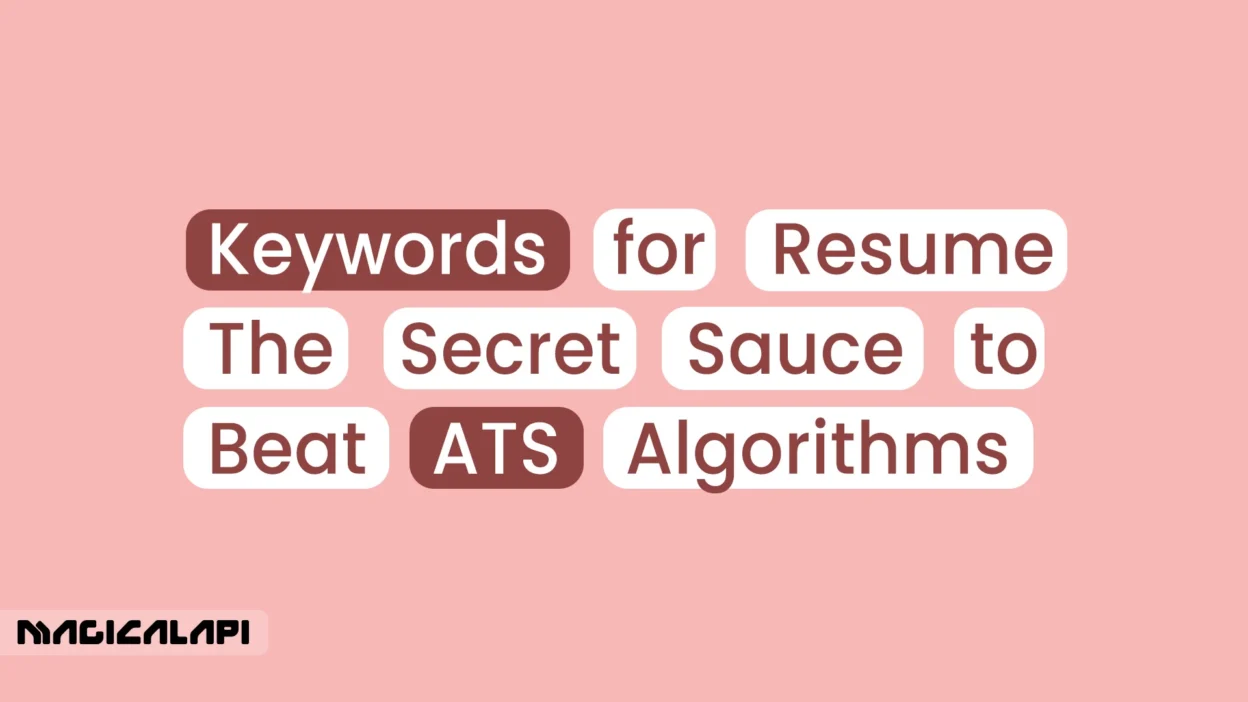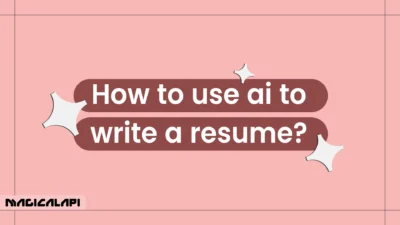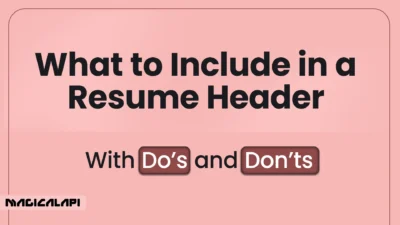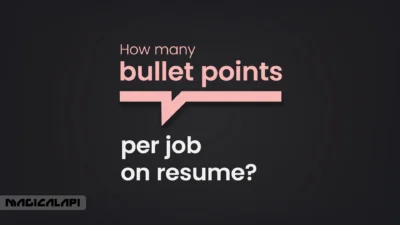In today’s highly competitive employment environment, you must produce a resume that stands out, not only to the human eye. Before your resume is ever reviewed by a hiring manager, it may likely already have to pass through an Applicant Tracking System (ATS).
This software is now the gatekeeper of the hiring realm, and understanding how to optimize a resume for an ATS is the crucial component for being hired at your dream job. The secret? The keywords! This comprehensive guide will provide you with everything you need to know about using the right keywords for resume to get your resume noticed.
Table of Contents
Why Resume Keywords Matter in Modern Hiring
No longer will just a visually appealing resume, with a layout that flows and has some fancy fonts cut it. Now it’s all about algorithms and data. Companies of all sizes receive hundreds, sometimes thousands, of applications for one vacant position. To put a dent into this overwhelming amount of applications, companies typically employ Applicant Tracking Systems and these systems are the first line of defense or the first layer of screening and sorting.
How does an Applicant Tracking System choose which resumes will move on? It searches for specific keywords for resumes that are related to the position description. If your resume does not contain the right native keywords for resume, your application can be weeded out before someone reads it, even if the application has all the qualifications listed in the description.
Because this is why knowing the right keywords and incorporating them in your resume are no longer simply an option, but rather a necessary step in a successful job search.
Read More: Marketing Resume Giude
How Applicant Tracking Systems Parse and Rank Keywords
An Applicant Tracking System is a software application that streamlines the hiring process. When you submit your resume online, the ATS will parse your resume data, meaning that it will scrape and classify the text data into fields such as Work Experience, Skills, and Education.
It will then search through this data and look specifically for keywords for resume and phrases that have been pre-determined by the hiring manager.
The system ranks your resume based on how well the keywords on your resume correspond with the job description. The better your keywords score, the more likely your resume will be flagged for a manual review by a recruiter. The applicant tracking systems rank resumes similarly to how search engines like Google rank websites based on keywords for resume. To get a high Resume Score we just have to understand how it parses and ranks resumes.
Magical Resume Score
Discover everything you need to know about Magical Resume Score , how it evaluates your resume, and the various options available to enhance your job application and improve your chances of success.
What are some keywords for a resume?
Now that you’ve grasped the ‘why,’ it’s time to get into the ‘what.’ What are some keywords for a resume? Any keywords for ATS resume that have meaning can be categorized, but broadly fall into a few types:
- Hard Skills: They are specific, teachable abilities that can be defined, and measured with a standardized test. Hard skills can be industry-specific or role-specific but are usually technical. Some examples would be actual programming languages like Python or Java, proficiency in software programs like Salesforce or Adobe Creative Suite, and technical skill areas like data analysis, or financial modeling.
- Soft Skills: These are personal attributes that describe how you work as a person; they are harder to quantify but equally important. Some examples are communication, teamwork, problem-solving, and leadership.
- Job Titles and Roles: very powerful are specific job titles related to the experiences in your past that are related to the position you are applying for. This is a great way to signal that you are a great fit.
- Industry-Specific Terms and Acronyms: every industry has an industry language. Using the proper language terminology and acronyms shows that you are comfortable and have expertise in the industry. A couple of examples would be from marketing, using terms like “SEO,” “PPC,” or “content syndication.”
Read More : How to Use AI to Write a Resume?
Researching Role-Specific Keywords Before You Apply
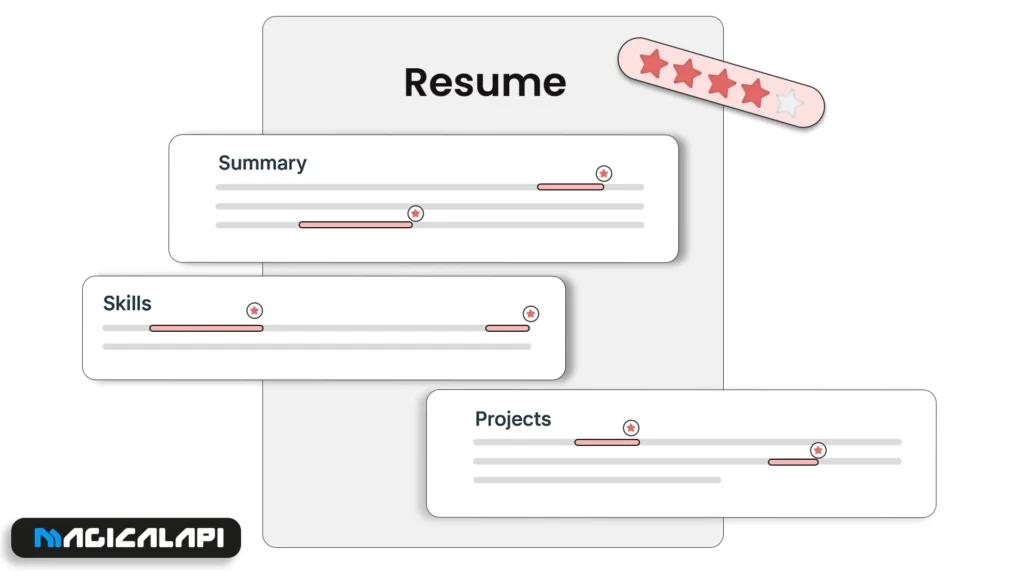
The best resume keywords are not general keywords, but tailored keywords specific to the job. Here is a step-by-step process for researching job-specific keywords:
- Step 1: Look at the Job Description: the job you are applying to is your first dictionary of keywords for resume. When you read the job posting, think about the words and phrases that you see over and over; especially in the Requirements and Responsibilities sections.
- Step 2: Review multiple Job Postings: Find multiple job descriptions for similar roles across multiple organizations. This will begin to show you the keywords and skills that are most consistently displayed across jobs, and all organizations within your industry.
- Step 3: Company Website and Values: Check out the company’s “About” and “Career” pages. This will help you identify the company culture and values (especially soft-skill keywords) and ensure you use them in your resumes.
- Step 4: Periodicals and Networking Sites: You can read industry blogs and articles to stay on top of opportunities in your sector. You can also use social networking sites like LinkedIn to view specific keywords for resume used in job postings from professionals already in place.
Ready to land that dream internship? Click to get an expert‑approved resume for internship tips instantly!
Industry-Focused Keyword Lists: Tech, Marketing, Finance, and More
To jumpstart your thinking about keywords for resume across different industries, here are a few examples:
Tech:
- Programming Languages: Python, Java, JavaScript, C++, Ruby, Go
- Frameworks and Libraries: React, Angular, Node.js, Django, Flask
- Cloud Platforms: AWS, Azure, Google Cloud Platform
- Databases: SQL, NoSQL, MongoDB, PostgreSQL
- Methodologies: Agile, Scrum, DevOps
- Tools: Git, Jira, Docker, Kubernetes
Marketing:
- Digital Marketing: SEO, SEM, PPC, Content Marketing, Social Media Marketing, Email Marketing
- Analytics: Google Analytics, HubSpot, Marketo, Salesforce Marketing Cloud
- Strategy: Brand Management, Market Research, Campaign Management, Lead Generation
- Creative: Copywriting, Graphic Design, Video Production
Finance:
- Analysis: Financial Analysis, Financial Modeling, Data Analysis, Variance Analysis
- Reporting: Financial Reporting, Budgeting, Forecasting
- Compliance: GAAP, SOX, Risk Management
- Software: QuickBooks, SAP, Oracle, Excel (Advanced)
- Certifications: CPA, CFA, CMA
Read More: How many bullet points per job on resume?
Power Verbs vs. Empty Buzzwords: Choosing Impactful Language
Keywords are important, but the language you use to frame them is just as valuable. Don’t use stereotypical, jargon-filled buzzwords (e.g., “go-getter,” “team player,” or “results-oriented”). These words carry little real meaning and don’t describe your abilities.
Use strong action verbs that identify your accomplishment. The use of these verbs adds strength and supports the wording of the statements you use. For instance, instead of “Responsible for managing a team,” you could use “Led a team of five to increase revenue by 15% in one quarter.”
Examples of power verbs:
- Leadership: accelerated, coordinated, directed, guided, mentored, and oversaw
- Achievement: accomplished, attained, exceeded, maximized, pioneered, succeeded
- Communication: articulated, authored, corresponded, presented, promoted, publicized
- Problem-Solving: analyzed, assessed, diagnosed, resolved, streamlined, troubleshot
Showcasing Quantifiable Achievements as Keyword Magnets
Numbers provide stronger statements than words, especially to an ATS and a recruiter. Whenever you can, quantify your accomplishments. This not only makes your accomplishments less vague, but also creates powerful keyword magnets.
Instead of: “Increased traffic to the website.” Say: “Increased organic traffic to website by 40% within six months using strategic SEO implementation.”
This statement not only contains the keyword “SEO” but also contains a quantifiable result, so it is much more powerful. Look for every scenario or accomplishment you can quantify related to revenue growth, cost reductions, improvements in efficiencies, and improvements in customer satisfaction.
Integrating Soft-Skill Keywords Without Sounding Generic
Demonstrating soft skills on a resume can be quite difficult. For example, simply stating “Good communication skills” is not enough. You have to be able to provide some kind of context and evidence. Place the soft-skill keywords for resume in the descriptions of your work experience.
Rather than a specific “Soft Skills” section, you should demonstrate soft skills through your accomplishments. For example, you could showcase your “collaboration” skills by stating: “Collaborated with cross-functional teams (marketing, engineering) to maintain an insistent schedule for new product launch.”
Optimizing Keywords for Remote and Hybrid Job Descriptions
With the recent increase in remote and hybrid work opportunities come new words. If remote or hybrid work is your target, your resume needs to reflect that. Examples of keywords for resume you can include would be:
- Remote work
- Virtual teams
- Distributed workforce
- Telecommuting
- Collaborative tools (ie., Slack, Zoom, Asana, Trello)
- Time management
- Self-motivated
Entry-Level vs. Senior Roles: Adjusting Your Keyword Strategy
Your choice of keywords should progress in accordance with your career.
- Entry-Level: Target your education, relevant classes, internships, and transferable skills. Ponder what keywords for resume would reflect potential and don’t hesitate to include willingness to learn or skills you have developed as part of academic projects or volunteer activities.
- Senior Roles: Add any leadership experience, target the ability to think strategically, and use a proven record of achievement keywords. Use keywords that showcase expertise and again focus on what relevant business results might result from your expertise, e.g. leadership skills, budgets, complex projects, and past team management.
Strategic Keyword Placement: Sections That Recruiters Scan First
The placement of your keywords is as important as which keywords you choose. Recruiters and ATS systems read resumes in a specific order. The most impactful elements to target are:
- Resume Summary or Objective: This is the first thing a recruiter will read, so fill it with your most relevant equipment and experience by pulling keywords out of the job description.
- Work Experience Section: This is the guts of your resume. Use bullet points and action verbs to describe what you accomplished, and naturally use keywords throughout.
- Skills Section: Use your section to list your hard skills, software skills, and certifications. This will make it easy for an ATS to find clarity.
Common Keyword Mistakes That Lead to Automatic Rejection
Stay away from the following common mistakes that could cause your resume to be rejected by the ATS:
- Keyword Stuffing: Don’t firehose your resume with lots of keywords. Make sure they are present in a natural and contextual way. Using too many keywords will make your resume unreadable to a human recruiter.
- Using Graphics or Images: Many ATS can’t parse anything from images, charts, and complex formatting. Stick to the basics and keep your format and layout simple and clean (Remember a hiring manager may still receive your formatted resume).
- Using the wrong terminology: Using the wrong terminology or industry jargon can make you look inexperienced.
- Spelling/Grammar Mistakes: Both ATS and human recruiters will see spelling/grammar mistakes as red flags. There’s no substitute for proofreading your resume. Online resume checkers can also be a helpful tool in catching errors.
Magical Resume Checker
Discover the full potential of the Magical Resume Checker and explore the various options available to enhance your resume, optimize it for applicant tracking systems (ATS), and improve your chances of landing your dream job.
Keywords for Resume Scanners
Understanding keywords for resume scanners is crucial. These scanners are the technology behind the ATS that reads and interprets your resume. To optimize for them, you should:
- Common Fonts: Use common and easy-to-read fonts like Arial, Calibri, or Times New Roman.
- Simple Formatting: Do not use tables, columns, or headers/footers as the scanners may have problems reading them properly.
- Standard Section Headings: Use headings like “Work Experience,” “Skills,” and “Education,” which are clear and conventional.
Updating Your Resume with Emerging Trends and Future-Proof Keywords
The job market is always shifting and so are the in-demand keywords. Here are a few ways to stay on top of it:
- Follow Industry News: The industry you are in likely has news about any emerging technologies, skills, and/or trends. Be sure you are aware of what is happening in your industry.
- Talk to Others: Have discussions with your industry about what skills are starting to become more important.
- Keep Learning: Look at self-learning methods like online courses or certifications to develop your set of skills and have more of them to market.
Tools and Resources for Finding Resume Keywords
There are several online options to help find the keywords that are right for your resume:
Jobscan
This tool compares your resume to the job description and provides you a match score and highlights items you are missing.
Word Clouds
Word clouds let you paste a job description to visually represent the words that are most important to the employer.
Look at the profiles of people who work at your target role and see what keywords they are using.
The Human Element: Why Keywords Aren’t Everything
It’s important to optimize your resume for ATS, but remember that the end goal is a human hiring manager. Your resume needs to be a persuasive story demonstrating your unique value proposition. A few keywords will get you past the preliminary screening; a solid narrative that’s engaging and full of achievements will get you the interview.
If you’d like more context for understanding how this first step in screening works, it might be useful to know about What is Resume Parsing. For a foundational understanding, an article on What Is a Resume? is useful contextual reading.
Conclusion: Resume Keywords
The process of leveraging keywords for resume is a timeless advantage in today’s job search. Understanding how Applicant Tracking Systems (ATS) function, doing some research on keywords that are pertinent to the role, and incorporating them into your resume will definitely improve your chances of being seen by recruiters!
Also remember to personalize your resume for every application, focus on anything you can quantify in your achievements, and keep a professional-yet-friendly tone. With the right keywords as your secret sauce, you will be on your way to beating the ATS algorithms and finding your next great opportunity!
FAQs for keywords for resume
1. How many keywords should I use on my resume?
There’s no magic number. The goal is to use them naturally and strategically. Focus on the most relevant keywords from the job description and aim to include them 2-3 times throughout your resume in different sections. Avoid keyword stuffing.
2. Should I use the exact same keywords as the job description?
Yes, as much as possible. Many ATS are programmed to look for exact matches. However, you can also include variations and synonyms where it makes sense to demonstrate a broader understanding.
3. Where is the best place to put keywords on my resume?
The most important places are your resume summary/objective, work experience section, and a dedicated skills section. Sprinkling them throughout these key areas will maximize your visibility to both ATS and human recruiters.
4. Can I use a generic resume for multiple job applications?
It’s highly recommended to tailor your resume for each job application. This allows you to incorporate the specific keywords and requirements of each role, significantly increasing your chances of passing the ATS scan.
5. What are some examples of keywords for resume skills?
Keywords for resume skills can be divided into hard skills and soft skills. Hard skills include things like ‘Python,’ ‘Data Analysis,’ ‘SEO,’ ‘Financial Modeling,’ and ‘Graphic Design.’ Soft skills include keywords like ‘Leadership,’ ‘Communication,’ ‘Problem-Solving,’ ‘Teamwork,’ and ‘Adaptability.’ The best keywords will be specific to the job you are applying for.


